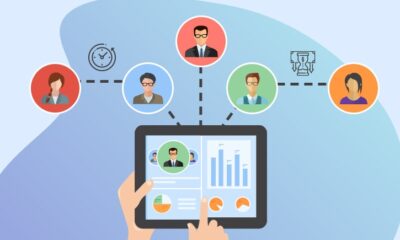Business
How COVID-19 Has Changed How Organizations Use IT

No one can deny that COVID-19 has had a big impact on business. For the typical employee, it has meant that they’ve needed to work from home for a time, but for the business owners and IT team it has meant something quite different: in many cases, the organization has needed to completely shift how it does business.
The benefits are there: research shows that an employee’s productivity is significantly higher when working from home. Because of this, it’s likely that the shifts are long term if not permanent, with Gartner finding that 41 percent of workers will continue to work from home post-pandemic.
However, to fully capitalize on the opportunities that remote working enables, an organization also needs to undertake a transformation exercise to modernize their systems and allow them to be fully engaged in cloud-based technology and services. Unfortunately, 70 percent of transformation projects fail, and organizations have needed to try to transform rapidly to adjust to the “new normal” of work.
Key transformation learnings
There are a couple of key focuses that enterprises have needed to keep an eye on as they have shifted to remote work best practices:
1) Security: One of the reasons that many corporations were hesitant to embrace work from home prior to the pandemic was concerns over security. To allow remote work the enterprise needs to open its network to be accessed online, and that is a potentially business-ending security risk, with the fines for the loss of data becoming very extensive. One solution has been the deployment of VPNs, which help to ensure privacy while working online, but enterprises also need to consider that employees are using personal (consumer)-grade technology, they’re using insecure communications tools like Zoom to collaborate, and they remain vulnerable to social engineering (where a hacker convinces them to hand over their details).
2) Business continuity: One thing that COVID-19 has made abundantly clear is that businesses of all sizes were not ready for a major event such as a pandemic. Research shows that over half (51 percent) of organizations didn’t have a business continuity plan at all. Business continuity covers everything from the creation of data backups, the storage and archival of old records, as well as contingencies in case something happens to the office or if staff are unable to work as normal. Building a robust and comprehensive business continuity plan is critical to the health of an organization, and increasingly it is technology solutions that deliver that continuity.
3) Automation: A driving goal for many transformation exercises is to prepare the business for automation. Automation is another key part of business continuity, in that it allows business functions to continue even if staff can’t access the site, but it also has a strategic role to play; by taking mundane tasks off the hands of employees, it frees them up to undertake more important jobs. For example, a chatbot providing first-level customer support frees the customer support professionals to address the more complex challenges in a more timely way, leading to greater levels of customer satisfaction.
4) Communication: Finally, any transformation exercise in response to COVID-19 needs to emphasize how employees will continue to communicate with one another when physically distanced. This means more than giving them an email and video conferencing access. A proper communication platform will also include document sharing and real-time collaboration so multiple people on the team can work on a task simultaneously, and it should include messaging, calendars, and workflow management. Without being able to have the little side-conversations that so characterize an environment, it’s also important that the communications tools are easy to use and highly accessible, to encourage people to continue communicating on an impromptu basis through the day.
The general consensus is that enterprises will actually emerge from the disruption of COVID-19 in a healthier position than they went in; the changes that COVID-19 has pushed on them have been challenging, but the transformations that organizations are going through were already on the cards – it’s just that the onset of the pandemic has accelerated changes that were already occurring. Those organizations that are able to modernize their environments and enable remote work will find their businesses highly competitive, set for innovation, and differentiated as business starts to pick up again.
-

 Business6 days ago
Business6 days agoS&P 500 Soars in Best May in Decades Amid Tariff Relief and Nvidia’s Surge
-

 Immigration6 days ago
Immigration6 days agoTrump’s Immigration Crackdown: Legal Battles and Policy Shifts
-

 Business6 days ago
Business6 days agoUS Stock Market Soars in May Amidst Tariff Tensions and Inflation Worries
-

 Government6 days ago
Government6 days agoTrump Administration’s Government Reshaping Efforts Face Criticism and Legal Battles
-

 Business6 days ago
Business6 days agoTrump’s Tariffs: A Global Economic Reckoning
-

 Foreign Policy3 days ago
Foreign Policy3 days agoInside Schedule F: Will Trump’s Federal Workforce Shake-Up Undermine Democracy?
-

 Press Release3 days ago
Press Release3 days agoIn2space Launches Campaign to Make Space Travel Accessible for All





























